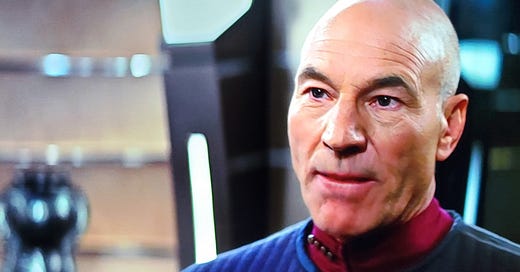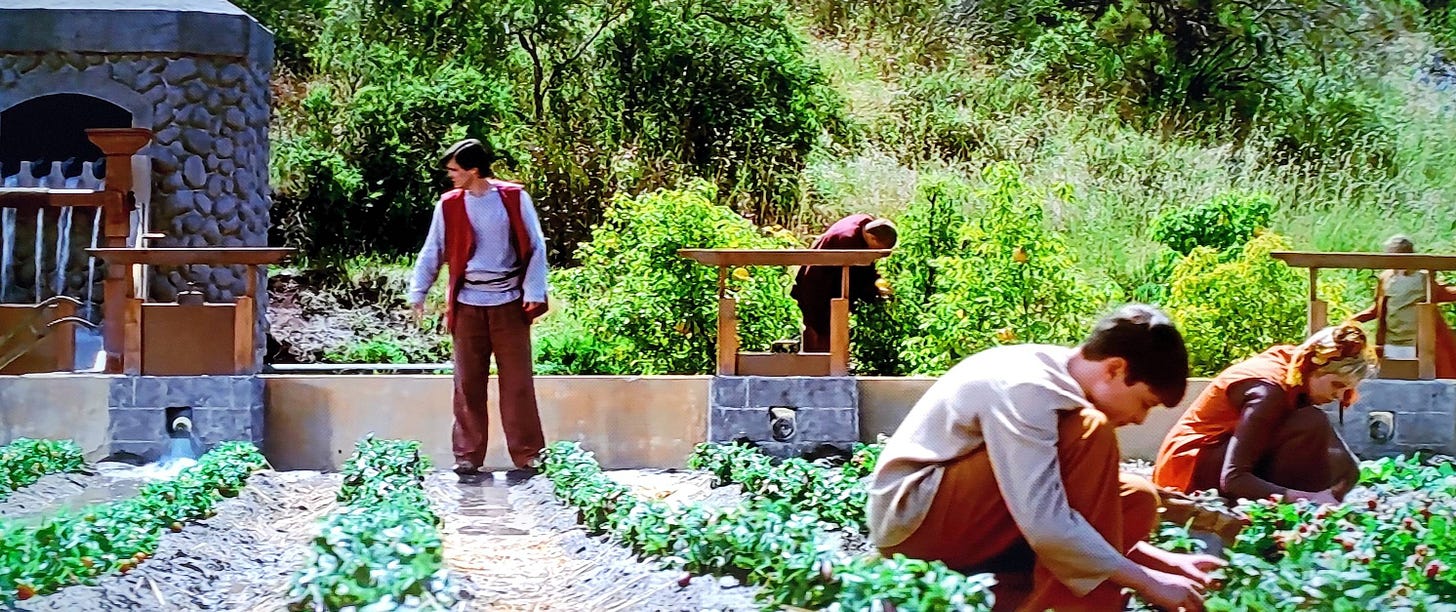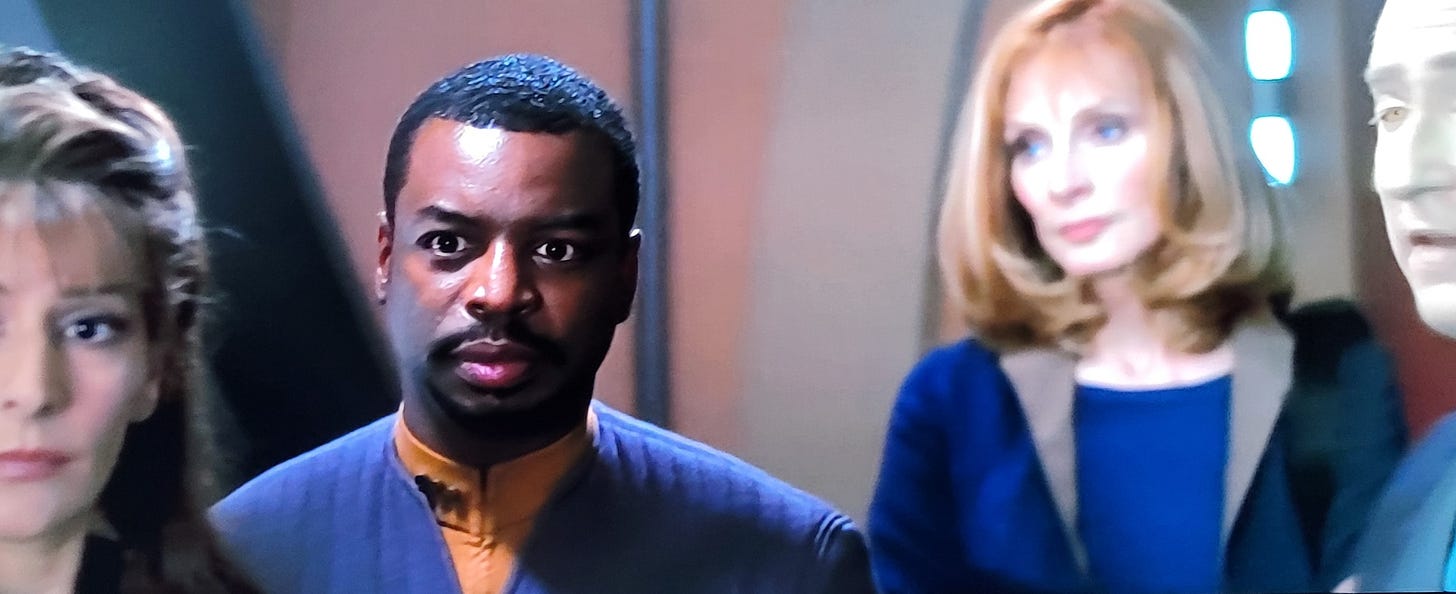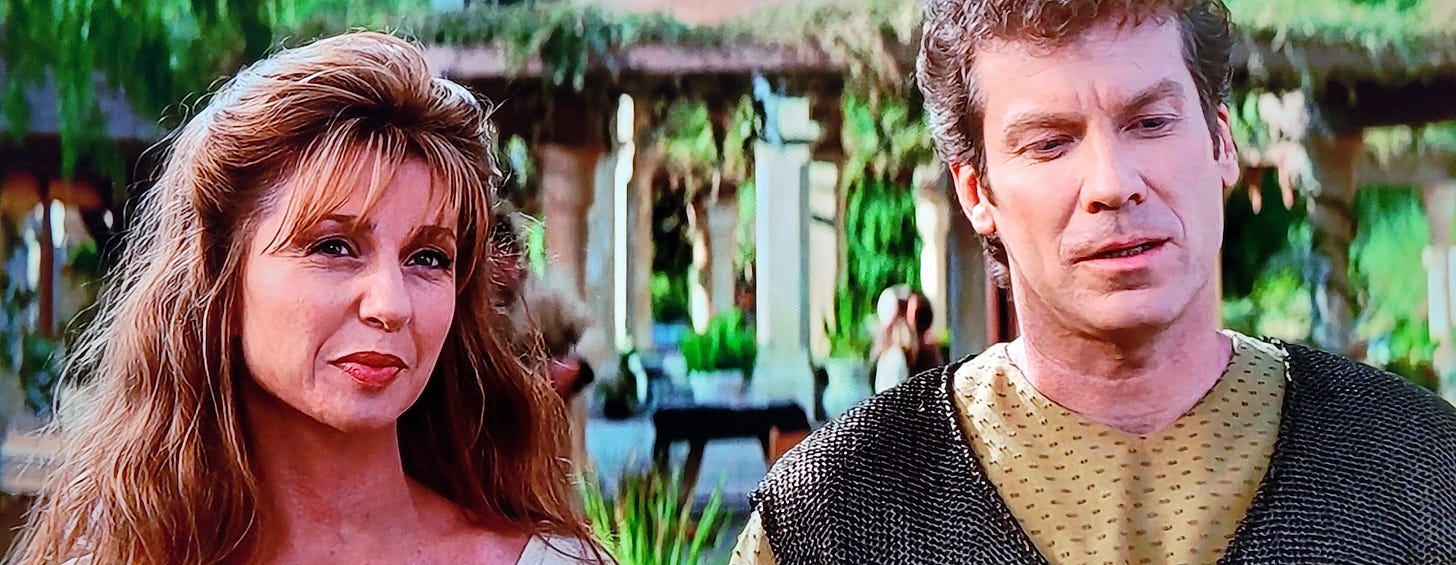A new Substack - Lessons from Star Trek
Today, some general comments, and then some Star Trek: Insurrection, vaccine mandates, and the technological life
I have long had the thought that you could spend forever drawing applications from the various Star Trek series and movies for our day, and of course it is fun to talk Trek. So why not finally start doing that? The show can be surprisingly profound at times if you have eyes to see that, and this is why it has already spawned books like “Star Trek and Philosophy: The Wrath of Kant”, which I read and enjoyed many years ago. Or, for example, I have long told myself that I needed to write a post about Star Trek: TNG’s “The Measure of a Man” which actually has a great pro-life message in it… not today, but we’ll get to that eventually.
But… there is a bit of a quandary. One of the reasons Star Trek makes for interesting watching in our day, from moral, political, and philosophical perspectives, is because it preserves the sensibilities of a classical liberalism that was more popular at the time. For example, as we’ll see in today’s post actually, the primary story line of Star Trek: Insurrection is all about the importance of preserving individual and small group rights even if infringing on those rights would be for the greater good (at least, the greater good as understood in one way). But classical liberalism is increasingly unpopular on both the Left and the Right in the United States. The Left has become highly technocratic, and basically wants to measure and control all aspects of human existence, and has very little concern for individual rights left at all inasmuch as they infringe upon that vision. Meanwhile many folks on the Right (the Roman Catholic integralists being the best illustration here) are concluding that classical liberalism just isn’t enough to hold a society together and must be replaced with a stronger vision (an unashamedly Roman Catholic state, for those integralists).
So even just thinking about writing these posts, I wasn’t sure if I should say “this is how life was in the Star Trek universe, and that is how it should be for us too”, or if just pointing out the contrast is interesting enough and people can draw whatever conclusions they’d like. And I think I’m going to lean in the direction of the latter. And even that is valuable… you know, people love these shows on a macro level and admire their characters and often don’t realize how much their own thinking diverges and opposes that of their fictional heroes. So it is valuable to point out that divergence.
So let’s dive into our first post here.
Star Trek: Insurrection
Star Trek: Insurrection is the third movie to take place in the Star Trek: TNG universe, and it came out at the end of 1998.
Summary
Most of the film takes place on the planet of a people known as the Ba’ku. They are only about 600 people on the entire planet, apparently in a single village, and they live a sort of agricultural and small trades existence. We eventually learn that they do have knowledge of high technology, but they have intentionally rejected its use.
The Ba’ku are being secretly observed by a combination Federation and Son’a force that has intentions to forcibly remove them from the planet prior to harvesting a metaphasic radiation produced by the planet’s rings, an operation that will kill everyone on the planet. The metaphasic radiation, we later learn, keeps the Ba’ku physically young (many of them are 300 years old), and the Federation and Son’a want to harvest that radiation to benefit the galaxy. (The Son’a also have some darker motives.)
Conflict begins when Data, an android who is a Federation officer but apparently not in on the scheme, uncovers the plot by finding the ship that will be used to relocate the Ba’ku. He is shot by a Son’a weapon and loses his memory and sort of goes berserk, but his ethical subroutines take over and he also exposes the existence of the Federation/Son’a observing station to the Ba’ku. This also brings the Enterprise and its crew into the film as Data is one of their own, and it is now their duty to apprehend or eliminate him.
The Enterprise crew does apprehend Data and correct his malfunctions, and then they spend a good deal of time slowly discovering the plot to relocate the Ba’ku. Once Captain Picard understands what is happening, he objects vociferously to it, and Admiral Dougherty of the Federation orders him to leave the area. Picard and, eventually, his senior staff then decide that they’re going to fight against the planned relocation anyway, and Picard and many other officers head down to the planet, where they help move the Ba’ku into caves so the Son’a cannot transport them away, engaging in various phaser fights with Son’a drones and soldiers along the way.
Toward the end of the film we learn that the Son’a and Ba’ku are actually the same race. The Son’a is a group of young Ba’ku who were expelled from the planet a century ago after they tried to take over the village and, of course, they’ve been aging normally since then. So not only are they seeking eternal youth, they are also seeking revenge against their parents. The Son’a commander has been unable to remove all of the Ba’ku from the planet but decides to proceed with the harvesting operation anyway, which will kill not only the Ba’ku on the planet, but also those that have been transferred to his ship, because in his growing cruelty he orders them to be placed in an unshielded section.
Meanwhile Captain Picard has been captured and transferred to the Son’a ship, and he convinces one Son’a officer that this is all wrong and must be stopped. They take control of the Son’a ship and, through various battles and conflicts, both the Son’a commander is killed and the collector to be used for the harvesting operation is destroyed. And the movie has, actually, quite a happy ending, the Ba’ku go back to their village, and their Son’a children are reunited with them and begin the healing process.
Captain Picard against vaccine mandates
OK, there are two big lessons to pull from this film. The first is, oh my goodness the parallels are just too good - if you are a fan of vaccine mandates, you would have to conclude that Picard and the Enterprise crew, the heroes of this movie, made the wrong decision. The Son’a and the Federation schemers are actually the good guys. The math here is very simple, as Admiral Dougherty says:
Jean-Luc, there are 600 people down there. We'll be able to use the regenerative properties of this radiation to help billions… With metaphasics, lifespans will be doubled. An entire new medical science will evolve. I understand your chief engineer has the use of his eyes for the first time in his life. Would you take that away from him?
And yes, Geordi LaForge, the chief engineer of the Enterprise, is blind, but exposure to the metaphasic radiation has been restoring his vision. So the utilitarian calculus would seem to be pretty simple there. Compelled vaccination is unfortunate… sorry, I meant forced relocation is unfortunate, but small harm to 600 people to benefit billions, this math is easy.
Picard won’t have it though, and he gives the most memorable micro-speech of the film.
We are betraying the principles upon which the Federation was founded. It's an attack on its very soul… How many people does it take, admiral, before it becomes wrong, hmm? A thousand? Fifty thousand? A million? How many people does it take, admiral?
As I said above, Picard is the hero in this movie for standing up for individual and small group rights, against a claim that violating those rights is justified to improve the health and extend the lifespan of many others. Could you ask for a better illustration for COVID-world?!
Later LaForge does also affirm,
Captain, how could I look at another sunrise knowing what my sight cost these people?
There is one more parallel worth mentioning here. Although this changes at the end, for most of the film the Son’a want to forcibly relocate the Ba’ku, but they are unwilling to actually kill them. The parallel here would be people who are unwilling to actually have you forcibly injected with an unwanted vaccine… but they would cause you to lose your job and lose access to public places if you won’t “voluntarily consent”. It speaks to the fact that, at some level, they do realize that the compelled medicine they are demanding is wrong, so they’re unwilling to go “all the way” with their demands… but they’ll go pretty far. However, another pattern we see in the film is that there are always some people who refuse to comply, therefore your actions against them must become more and more cruel, and in this film it does escalate to the point where the Son’a decide to simply kill the Ba’ku. I don’t have to tell you that continual escalation is also something we’ve observed in COVID-world.
The negatives of technological society
It is more difficult to articulate, but another thing that might be said is that the Ba’ku are a people who have intentionally rejected most technology. They have some machines, even large ones (like a dam), but they all appear to be machines that are immediately operated by people.
In a memorable line, Sojef, the male Ba’ku above, says,
Our technological abilities are not apparent because we have chosen not to employ them in our daily lives. We believe that when you create a machine to do the work of a man, you take something away from the man.
That last sentence is a line worth thinking about. On my other Substack a few days ago I shared a quotation from Ivan Illich’s book Deschooling Society:
Surrounded by all-powerful tools, man is reduced to a tool of his tools. Each of the institutions meant to exorcise one of the primeval evils has become a fail-safe, self-sealing coffin for man. Man is trapped in the boxes he makes to contain the ills Pandora allowed to escape.
I’m not going to tell you exactly where you should draw the line when it comes to the appropriate or inappropriate use of technology, because that’s a very hard question. But it’s worth thinking about. Everyone today seems to realize that we sometimes really become the servants of our tools, or we are replaced by a tool in the name of efficiency and something important and human is lost in that replacement. And to what extent can you make the choice to limit your technological involvement and still be a part of society? Anij, the woman above, tells Picard at one point,
We've always known that to survive we had to remain apart. It hasn't been easy. Many of the young people want to know more about the off-land. They're attracted to stories of a faster pace of life.
Picard replies,
Most of my people who live that faster life would sell their souls to slow it down.
OK, that is all for today. Your comments on this very first post are especially welcome, thank you.







I’m going to see if the library has this one. I might have to start being a Trekkie. Good post. Can’t wait to read the next.